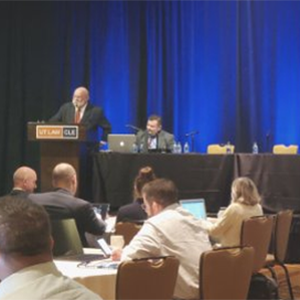
eCourse
Carbon Capture and Pore Space Issues
Contains material from May 2024
Technical Questions?
512.475.6700
service@utcle.org
Includes: Video Audio Paper Slides
Preview Sessions
Show session details
Keith B. Hall
Download session materials for offline use
Session 1 —30 mins
Carbon Capture and Pore Space Issues (May 2024)
Address the question of who owns subsurface pore space rights when there is a split estate, and discuss the typical terms and conditions of agreements by which prospective carbon capture and storage operators contract for the use of pore spaces. Also consider whether the law provides a mechanism for the use of pore spaces in the absence of the owner’s consent (eminent domain? pooling?), and examine whether the migration of carbon dioxide in the subsurface would give rise to an actionable trespass in the absence of contractual or other authority to use pore spaces.
Originally presented: Apr 2024 Oil, Gas and Mineral Law Institute
Keith B. Hall,
Louisiana State University Paul M. Hebert Law Center - Baton Rouge, LA